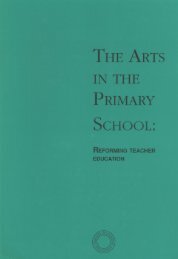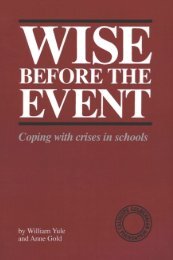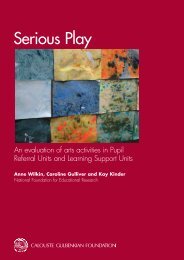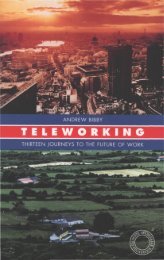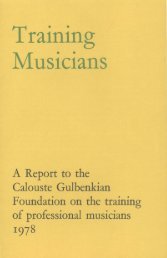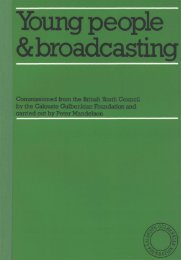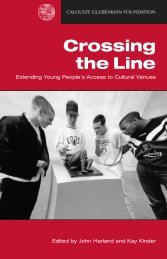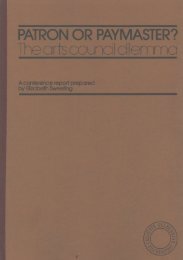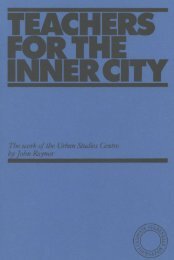The Arts in Schools - Calouste Gulbenkian Foundation
The Arts in Schools - Calouste Gulbenkian Foundation
The Arts in Schools - Calouste Gulbenkian Foundation
- No tags were found...
You also want an ePaper? Increase the reach of your titles
YUMPU automatically turns print PDFs into web optimized ePapers that Google loves.
stances and of the perennial and varied needs of children andyoung people, for a broad-based curriculum rather than onewhich is too occupied with academic learn<strong>in</strong>g.We have a general concern for the k<strong>in</strong>ds of curricula nowneeded <strong>in</strong> schools. We have a specific concern with thearts. What benefits can the arts confer on the school curriculumand what steps can be taken to realise them? We seethese general and specific concerns as <strong>in</strong>timately related <strong>in</strong> anumber of ways.2 Education <strong>The</strong> roles of schools <strong>in</strong> prepar<strong>in</strong>g children for employmentandhave been emphasised repeatedly <strong>in</strong> the current discussionsemployment on the curriculum. In the secondary school a premium isoften placed on exam<strong>in</strong>ation courses and academic qualifications.We believe this emphasis to be misplaced for threereasons.a Liv<strong>in</strong>g <strong>in</strong> the presentTo see education only as a preparation for someth<strong>in</strong>gthat happens later, risks overlook<strong>in</strong>g the needs andopportunities of the moment. Children do not hatch<strong>in</strong>to adults after a secluded <strong>in</strong>cubation at school. <strong>The</strong>yare liv<strong>in</strong>g their lives now. Help<strong>in</strong>g them towards an<strong>in</strong>dependent and worthwhile life <strong>in</strong> the adult world ofthe future pre-supposes help<strong>in</strong>g them to make sense ofand deal with the experiences which they suffer orenjoy <strong>in</strong> the present. <strong>The</strong> roles they adopt later andthe employment they will seek will partly depend onwhat they become as <strong>in</strong>dividuals — what capacitiesand capabilities are developed or neglected — dur<strong>in</strong>gthe formative years of education. It follows that schoolsshould enrich and broaden children's experiencesthrough a broad and balanced curriculum. Literacy andnumeracy are an important part of education. <strong>The</strong>yshould not be mistaken for the whole of it.b Structural unemploymentWe face a future <strong>in</strong> which opportunities <strong>in</strong> many acceptedareas of employment will cont<strong>in</strong>ue to decl<strong>in</strong>e. Levels ofunemployment are especially high among young peopleand school leavers. 1 This is not a pass<strong>in</strong>g feature ofthe recession. It is the result of long-term structuralchanges <strong>in</strong> the <strong>in</strong>dustrial economies. One aspect of thisis the development of new technologies. <strong>The</strong>se threatenvery much higher levels of unemployment and redundancy<strong>in</strong> future, not only <strong>in</strong> <strong>in</strong>dustry but also <strong>in</strong> commerceand <strong>in</strong> the professions. 2 All this <strong>in</strong>dicates profoundchanges <strong>in</strong> the established patterns of work<strong>in</strong>g life and



